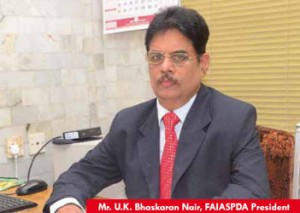 The proposed introduction of GST will surely be a major step towards taxation reforms. Associations like the Federation of All India Automobile Spare Parts Dealers’ Associations (FAIASPDA) have appealed to the Government to outline the roap map for introduction of GST, a purely computer-based system, to ensure smooth transition to the new tax system.
The proposed introduction of GST will surely be a major step towards taxation reforms. Associations like the Federation of All India Automobile Spare Parts Dealers’ Associations (FAIASPDA) have appealed to the Government to outline the roap map for introduction of GST, a purely computer-based system, to ensure smooth transition to the new tax system.
Addressing the FAIASPDA conference held in Bangalore recently, Mr. U.K. Bhaskaran Nair, its President, said VAT was introduced in April 2005 under which the taxation rate was kept at as high as 12.5 per cent because of which the trade suffered a lot. It also proved detrimental for a growing country like India. Its present form is quite cumbersome and complex, involving a lot of paper work. Hence the VAT laws should be made simpler and more transparent, enabling the State Governments to garner more resources.
According to him, the States have been successfully implementing VAT and reaping positive benefits thereof, as is evident from the buoyancy in tax revenue after its introduction. No State would lose its position of advantage by allowing the trade to be diverted to other States where VAT is lower.
Introduction of four per cent VAT would bring many traders within the tax net. Any loss in VAT would be compensated by the greater volume of trade, and the States would start garnering more revenue. There is thus need to bring down the rate of VAT on automotive spare parts & accessories from 12.5 per cent to 4 per cent and make it uniform all over the country, so as to save the trade and customers from the extra burden.
Mr. Bhaskaran Nair went on to disclose that according to press reports the State Governments have urged that the Central sales tax (CST) be raised back to four per cent from the current two per cent if the Centre refuses to compensate them for revenue losses. CST, a tax on inter-State movement of goods, was reduced from four to three per cent in 2007-08, and further to two per cent in 2008-09 after the introduction of VAT.
Most of the States, which have been adversely affected, strongly felt that in case the Government is not able to continue compensating States for the CST loss, it should increase the CST rate from two to four per cent.
On its part, FAIASPDA has stressed the need to exempt automotive spareparts from the ambit of the above rules on the ground that they are engineering items with their own peculiar problems.